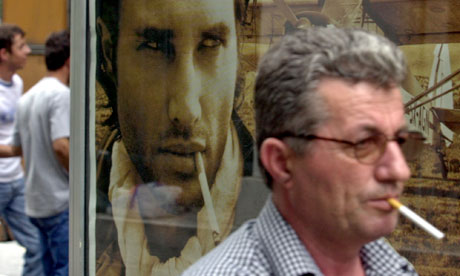
Change takes courage and in Greece change is everywhere. Reform, revolution, restructuring, call it what you will, the country is in the grip of massive transformation, spurred mostly by the realisation that without it cash-strapped Athens was heading for economic collapse.
But change is also painful, and of all the changes currently being enacted in a society historically resistant to reform, the government's campaign to stub out the nation's proclivity for a puff is proving to be more inflammatory than predicted.
Last month's state-sponsored attempt to get Greeks to stop smoking – with the enforcement of an unprecedented blanket ban on cigarettes in all public places – was never going to be easy. To date, Europe's heaviest smokers have snubbed at least eight such efforts.
The latest bid, more trenchant than any before, was aimed not only at improving the nation's health but arresting the lacerating effect the habit has had on the country's health system at a time when hospitals can barely afford needles, surgical gloves and other basic essentials. As I wrote in these columns at the launch of the campaign with 40% of the population "declared smokers" it is conservatively estimated that nicotine addiction costs the state over €2bn(£1.8bn) a year.
For the prime minister, George Papandreou, an avid non-smoker who to the surprise of many has managed to stop cadres from lighting up in the central offices of his Panhellenic Socialist Movement (Pasok), the ban was also a primary first step to making Greeks more health conscious and, in so doing, "revolutionising attitudes." In some small way it was hoped the ban could help clean up Greece's image, re-establish its shattered credibility less than four months after the IMF and EU agreed to emergency loans to stave off bankruptcy.
All of which might explain why smoking has become such a hot issue – not just for entrepreneurs and the patrons of cafes who, despite draconian penalties, still insist on lighting up, but for officialdom at large.
When in the course of testing the ban last month I wrote that I, too, had violated the law, flagrantly defying the prohibition at a soiree given by a government minister in a downtown bar, the protests were vivid and loud. For many the piece amounted to crass stereotyping of the country as a third-world state unable to apply the rule of law.
Greeks, perhaps more than ever before, are ultra sensitive about the way they are portrayed by the western press. The government, unquestionably the most cosmopolitan of modern times with the US-born Papandreou an internationalist par excellence, is acutely image conscious.
After inheriting a carcass of a Greek economy in the wake of five scandal-ridden years of conservative rule, the reform-minded socialists have borne the brunt of excoriating criticism from fellow EU states with Germany leading the charge that Athens had lied and cheated its way into the hallowed euro zone. Not infrequently, Greeks have been portrayed as jingle-jangle Zorbas, undeserving of EU membership.
The drastic steps that Papandreou's modernising government has taken to allay the crisis – with draconian cuts of wages, pensions and benefits in the public sector – have gradually helped shift the anachronistic perception of Greeks as lazy, happy-go-lucky Levantines.
But the sacrifices have also stoked the nation's innate anti-authoritarianism – an instinctive rebelliousness that authorities may not like but have encountered repeatedly in recent months.
The announcement this week by Greek bar and restaurant owners that they will be putting ashtrays back on tables – citing the prohibition's disastrous effect on business at a time of deep recession – should not take officialdom by surprise. Nor should coverage of the development be interpreted as below-the-belt criticism.
Rather, the collective snub is yet another example that the Greeks are not going to take this crisis and the hard-hitting changes that it has spawned, lying down.

